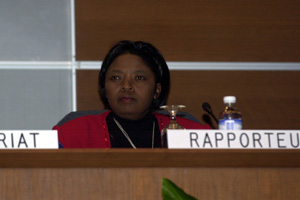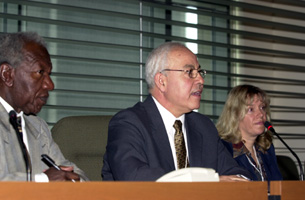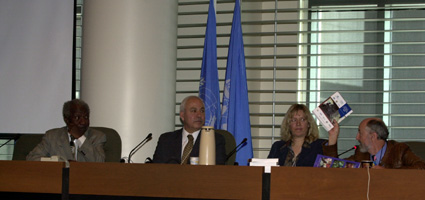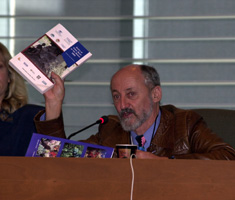|
|
|
Highlights for Monday, 10 March 2003
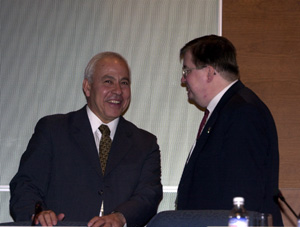 Delegates
to the eighth meeting of the Subsidiary Body on Scientific, Technical and
Technological Advice (SBSTTA) to the Convention on Biological Diversity (CBD)
met in Plenary to hear opening statements, address organizational matters,
consider progress reports on the implementation of the thematic programmes
and cross-cutting issues, and hear general comments on the multi-year
programme of work of the Conference of the Parties (COP) up to 2010. A
keynote presentation on mountain biodiversity was delivered.
Delegates
to the eighth meeting of the Subsidiary Body on Scientific, Technical and
Technological Advice (SBSTTA) to the Convention on Biological Diversity (CBD)
met in Plenary to hear opening statements, address organizational matters,
consider progress reports on the implementation of the thematic programmes
and cross-cutting issues, and hear general comments on the multi-year
programme of work of the Conference of the Parties (COP) up to 2010. A
keynote presentation on mountain biodiversity was delivered.Above photo L-R: Hamdallah Zedan, CBD Executive Secretary in discussion with SBSTTA-8 Chair, Jan Plesnik (Czech Republic) before opening plenary.
| Opening Plenary: |
 SBSTTA Chair Jan Plesnik (Czech Republic) (left) opened the meeting and outlined the agenda. He stressed SBSTTA's mandate to develop an indicative list of technologies for mountain biodiversity, and to substantiate the outcomes of COP-6 and the World Summit on Sustainable Development (WSSD), which each emphasized biodiversity as key to sustainable development. |
|
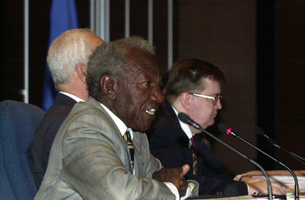 Paul Chabeda (left), on behalf of Klaus Töpfer, UNEP Executive Director, stressed the importance of the indicative list of technologies for mountain biodiversity and its socio-economic implications. |
|
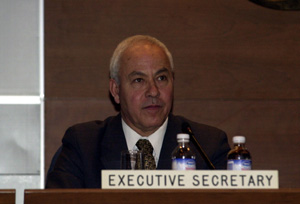 Hamdallah Zedan, CBD Executive Secretary (left), highlighted the links between biodiversity, poverty reduction and sustainable development. Noting that 45 Parties have ratified the Cartagena Protocol, he hoped that the Protocol's first meeting of the Parties would be held together with CBD COP-7. |
|
 Thomas Hofer (right), Food and Agriculture Organization (FAO), underscored the crucial role of water and mountain ecosystems to secure the livelihoods of poor communities and reduce poverty. |
|
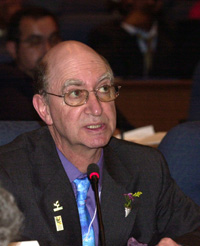 Peter Bridgewater, UN Educational, Scientific and Cultural Organization (UNESCO), presented UNESCO's joint activities with other UN agencies and programmes related to the 2003 International Year of Freshwater. He highlighted UNESCO's role as the Secretariat of the World Water Assessment Programme, whose report will be available at the 3rd World Water Forum. |
|
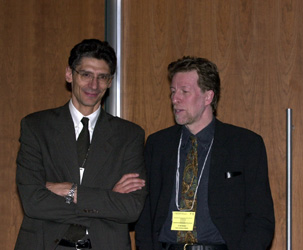 Nick Davidson ( far right with Marcos Silva, CBD), Ramsar Convention on Wetlands, presented the Ramsar Convention's COP-8 decisions relevant to mountains, inland waters and marine and coastal biodiversity, including on water allocation and management, dams, the River Basin Initiative, invasive species, impact assessment and temporary pools. |
|
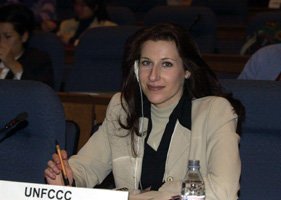 Hanna Hoffmann (left), UN Framework Convention on Climate Change (UNFCCC), reported on UNFCCC COP-8 decisions and conclusions regarding cooperation with the CBD and other conventions. |
|
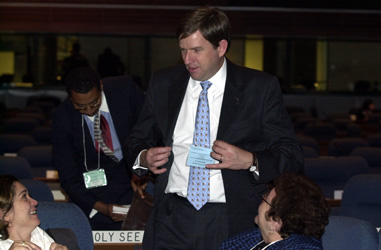 Cristián Samper (center), Millennium Ecosystem Assessment (MA), presented the MA's conceptual framework and activities. |
|
 Tunisia, on behalf of the AFRICAN GROUP said Africa is at the center of discussions on poverty alleviation and sustainable development, stressed regional efforts, and urged delegates to build on the progress made on access and benefit-sharing. |
|
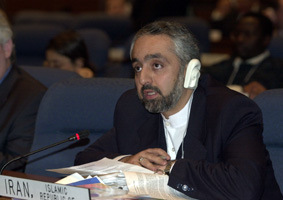 Iran, on behalf of the ASIAN AND PACIFIC REGION, reported on regional meetings and called for more preparatory meetings in the light of COP-7 being hosted in Asia. |
|
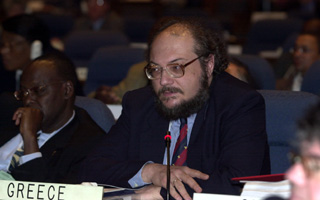 Greece, on behalf of the EU, reported on a preparatory workshop for SBSTTA-8 held in Germany. |
|
|
ORGANIZATIONAL
MATTERS:
|
|
| MULTI-YEAR
PROGRAMME OF WORK: On the Multi-year Programme of Work (UNEP/CDB/COP/6/5/Add.2/Rev.1 and 6/INF/30; SBSTTA/8/14; and MYPOW/4), several delegates opposed adding new agenda items to the existing programme of work, favouring in-depth review and implementation of existing themes. |
|
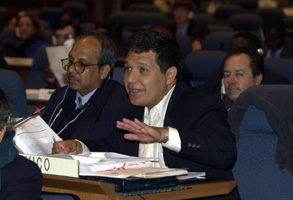 MEXICO stressed the need to revise SBSTTA's modus operandi. |
|
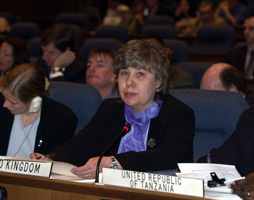 The UK recommended, inter alia, that each COP consider progress in achieving the 2010 target for reducing biodiversity loss and that new agenda items be limited to no more than three according to their potential to contribute to the target. |
|
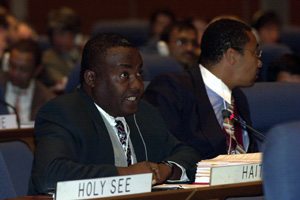 HAITI suggested focusing on social issues. |
|
KEYNOTE
PRESENTATIONS: 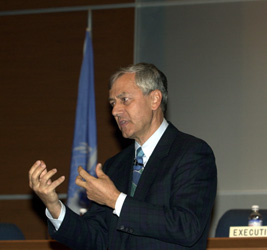 Christian Körner (right), Chair of the Global Mountain Biodiversity Assessment, made a presentation on mountain biodiversity, focusing on global hot spots, regional insurance and local livelihood. Explaining the reasons for caring for diversity, he underscored ethics, ecology and economy. He said that the concept of mountain should include altitude and latitude and explained the definitions of lowlands, montane, alpine and nival areas. He stressed that the safety of one sixth of the world's human population is dependent on mountain ecosystems. |
|
| SBSTTA-8 Side Event: | |
| Book Launch: Status of the Coral Reefs of the World 2002 | |
| Hamdallah Zedan, CBD Executive Secretary (above photo) emphasized the importance of coral reefs to biodiversity conservation and sustainable development. He also recognized the realized global economic benefit of coral reefs that generate around $30 billion in goods and services. Clive Wilkinson (right), gave an overview of the book. | |
|
Links
|
|
Back to Linkages home - Visit IISDnet
- Send e-mail to ENB |

